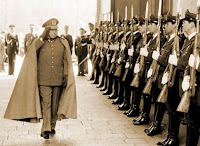Posted on September 6, 2021
This is an update of my post published on September 6, 2010:

On this day in 1968, Swaziland became fully independent of the United Kingdom.
In 2018, Swaziland was officially renamed Eswatini.
This small, landlocked nation is almost entirely surrounded by the larger country South Africa (with a small border shared with Mozambique in the east). Landlocked means that the nation doesn't have access to an ocean or sea. It's land that is "locked up" in the middle of more land!
About three quarters of Eswatini's people work in subsistence farming, which means that they farm for themselves and their families and have basically no surplus crop to sell. Subsistence farmers grow their own food, build their own houses, and live without regularly buying things in any kind of store or marketplace.
Tragically, the HIV infection rate in Eswatini is very high—the highest in the world. Almost a third of people ages 15 to 49 have the disease!
Eswatini is ruled by a king who traditionally rules along with his mother or a ritual substitute. The king chooses a prime minister and also appoints a small number of legislative representatives, with the people electing the majority of the legislators. Apparently the king has an awful lot of power, which some citizens don't like. As a matter of fact, the current king has been said to rule "with an iron fist," and citizens have been agitating for democracy this summer (starting late June 2021). Their protests have sometimes broken into riots, looting, arson, and even street skirmishes between military and citizens. It's difficult to know what's going on, because the government shut down the internet; there are rumors that the king fled the nation, but the government denies this.
- Eswatini preserves its folk culture by educating and including young people in its traditions and institutions. This photo shows a princess during the traditional Reed Dance. And here is a video with some kids and foreigners learning a dance and song.

- Check out this website about Eswatini.
Also on this date:
 |
Plan ahead:
Check out my Pinterest boards for:
And here are my Pinterest boards for:
















No comments:
Post a Comment